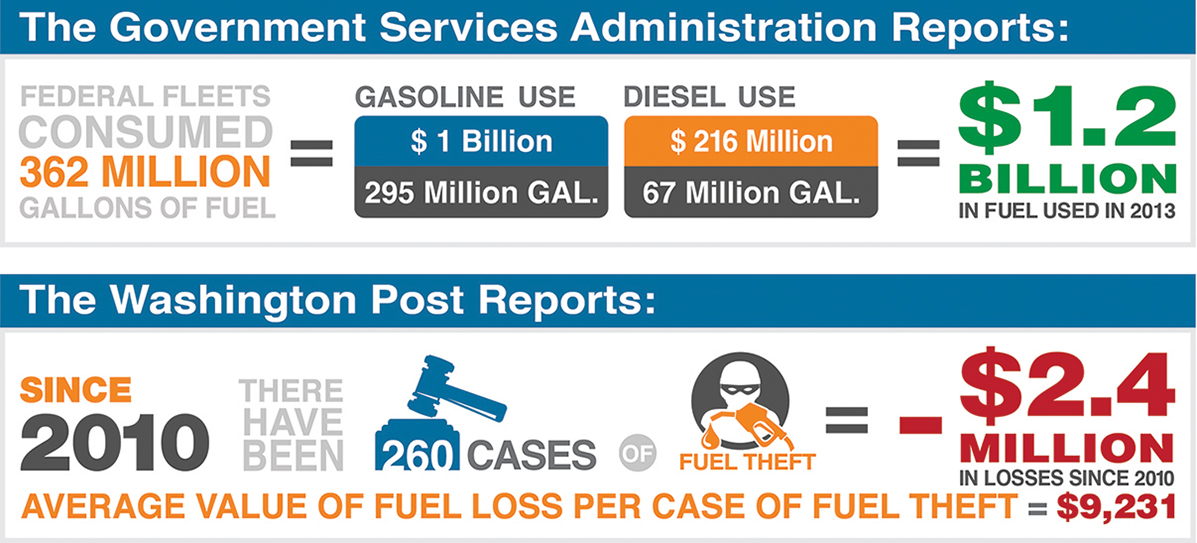
Fleet management is a big job in and of itself. An even bigger job? Fleet management funded by taxpayer dollars.
Government fleet managers who operate in the public sector — whether they are at the federal, state, county, or local level — have a responsibility to ensure that fuel resources are being used responsibly and managed efficiently. However, this represents an ongoing government fleet management challenge, due to the widespread opportunity for fuel theft and reporting errors.
Case in point: The Government Services Administration reports that over $1.2 billion worth of gasoline and diesel were consumed by federal fleets in 2013. The Washington Post reports, that since 2010, there have been about 260 cases of U.S. government employees stealing fuel, resulting in a staggering $2.4 million worth of fuel theft.
Monitoring fuel inventories and fuel usage has become an imperative cost-control measure for effective government fleet management. Revenue losses caused by fuel theft are major concern, and those losses can be difficult to detect. Drivers who abuse over-the-road fleet cards and credit cards to skim fuel for personal use are a common cause of diminished assets. Fuel inventories are also vulnerable to unscrupulous fuel distributors who short-change resupplies. Identifying small, incremental inventory losses such as these can be nearly impossible for fleet managers charged with reviewing a fleet’s fuel consumption. Inaccurate inventory measurement and inefficient data management practices can further drain a fleet manager’s operating budget.

Not only does fuel represent one of the most costly expenses facing fleet managers, the technology used to manage it continues to advance. With decades of experience in the fuel management industry, OPW helps fleet managers navigate the complex world of fuel control, helping fleets keep their bottom lines in tact. With extensive expertise in the needs of government fleet management and fleet fueling operations, OPW can design a fleet fueling infrastructure that fits the budgetary, logistical and reporting needs of both small and large government fleets. Here are five strategies OPW recommends public-sector fleet managers deploy in order to judiciously and efficiently manage costly fuel assets:
1. Track fuel usage for user accountability. Instituting a fuel control system is an essential government fleet management practice for preventing misuse of expensive fuel assets. With features like the ability to track and report fueling by card or pump totals, or the ability to group individual drivers and vehicles into accounts for easier control of group restrictions, fuel control systems provide definitive user accountability that government fuel site managers can depend on to simplify government fleet management.
2. Automate fueling authorization for reduced management overhead. Fuel control systems deliver 24-7 automated fueling authorization and data management. They eliminate the need to staff an attendant at the yard, while consolidating data management and reporting.
3. Reconcile to minimize reporting errors. In order to obtain truly accurate fuel inventory reports, fuel sites need to reconcile ALL of the fuel that is being pumped into and out of storage tanks. Today, powerful fuel management software, such as Phoenix SQL®, will reconcile the amount of fuel being pumped into a tank during a resupply delivery with the amount of fuel being pumped into vehicle tanks. The software not only significantly streamlines management of inventory and financials for fuel site managers, fuel purchasers and auditors alike, it offers flexibility with account/jurisdiction configurations. Phoenix provides multiple levels of account access — users can be configured to monitor a single site within a jurisdiction, multiple sites within a jurisdiction, or even multiple jurisdictions for high-level monitoring of fuel supplies that is both comprehensive and efficient.
4. Centralize fuel management processes to streamline data management. For large government fleets that are spread out among multiple sites — locally, regionally, or even nationally — a centralized fuel management strategy can significantly streamline data management. Phoenix SQL, for example, can store a centralized card database and create “Fuel Zones” that limit where fleet cards are authorized to fuel.
5. Reduce overhead through integrated technology. To obtain a lean fuel management system, government fleet managers should select an integrated fuel control system, tank monitoring system and fuel management software that deliver maximum compatibility. As the only petroleum equipment manufacturer in the fuel industry today providing both fleet fuel control and inventory monitoring equipment, OPW is uniquely positioned to provide solutions that deliver superior compatibility. OPW’s integrated catalog of fuel management, control and reporting products ensure that any site’s fueling infrastructure is reliable and built for seamless interaction from one component to the next.
In addition to its comprehensive portfolio of equipment solutions, OPW provides a wealth of customer support tools on its website to assist government fleet managers. Detailed product information, insightful “how-to” product videos and downloadable software upgrades are just a few of the resources available at
www.opwglobal.com. Downloadable bid specifications, which are available for several of OPW’s “workhorse” fuel management solutions — including
OPW’s FSC3000™ Fuel Site Controller,
Petro Vend 100® Fuel Control System,
SiteSentinel® Integra 100™ Console and
SiteSentinel® Integra 500 Console — help streamline the bidding process of public sector fuel sites.
To develop a new fuel management strategy tailored for a particular municipal, county, state or federal fleet’s needs, or to identify strategies for streamlining an existing jurisdiction’s fleet fueling management practices, call OPW Fuel Management Systems today at (708) 485-4200 and ask to speak with the Commercial District Manager from your region.
This article is part of OPW’s educational series, Focus on Fuel Control, designed to educate distributors, customers and end-users about trends and challenges facing commercial, terminal, fleet and government fueling applications. Visit the Focus on Fuel Control page regularly to read future articles from the Fuel Management experts at OPW.